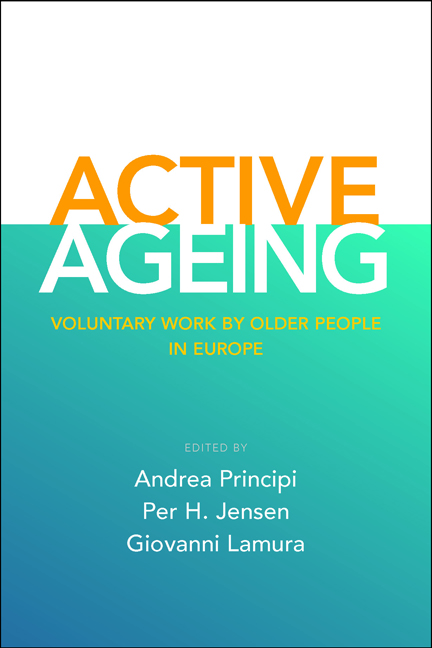Book contents
- Frontmatter
- Contents
- List of tables and figures
- Notes on the contributors
- Acknowledgements
- Foreword
- Part I Realising volunteering by older people in Europe An overarching approach
- Part II Opportunities and restrictions for older volunteers National experiences
- Part III Opportunities and restrictions for older volunteers Case studies in European voluntary organisations
- Part IV Conclusions
- Index
fourteen - Conclusions: enhancing volunteering by older people in Europe
Published online by Cambridge University Press: 05 March 2022
- Frontmatter
- Contents
- List of tables and figures
- Notes on the contributors
- Acknowledgements
- Foreword
- Part I Realising volunteering by older people in Europe An overarching approach
- Part II Opportunities and restrictions for older volunteers National experiences
- Part III Opportunities and restrictions for older volunteers Case studies in European voluntary organisations
- Part IV Conclusions
- Index
Summary
Introduction
As observed in Chapter One, ‘active ageing’ represents an overarching aim of current European Union (EU) policies. Defined as the process ‘of optimising opportunities for health, participation and security in order to enhance quality of life as people age’ (WHO, 2002), it should be intended as an effort to maximise participation and well-being as people age, at the individual, organisational and societal level (Walker, 2002). According to this perspective, the current ageing of the European population can be seen in a positive way, since the capacity to perform activities at an advanced stage of age has sharply increased in recent years. A current 70-year-old or even an 80-year-old corresponds to a person 15 or 20 years younger living a century ago, and in this sense, European society is not actually ageing, but rather ‘rejuvenating’ (Giarini, 2009). In recent years, policy makers and the scientific community have increasingly recognised that, through active ageing, older people can greatly contribute to society, thus active ageing benefits society as well as older individuals in terms of better health and life satisfaction (Walker, 2011). This implies a striving to increase the participation of older people in a range of social activities within and outside the labour market. Volunteering is an important field in which active ageing can be realised, and several policy efforts in this direction have recently been undertaken by the EU, through activities planned within the European Year of Volunteering and the European Year of Active Ageing and Intergenerational Solidarity, in 2011 and 2012 respectively. But how can the formal volunteering of older people be enhanced in Europe, a rather variegated continent formed by the co-existence of different welfare regimes, with peculiar welfare mixes and legal frameworks? Although in the past a considerable number of studies have dealt with the issue of volunteering in older age (see, for example, Fischer and Schaffer, 1993; Morrow-Howell et al, 2001; Warburton and Cordingley, 2004), these studies have seldom offered a European comparative perspective on this issue, and analyses have hardly ever considered the micro, meso, macro and structural levels in a single study, with empirical evidence mainly lacking at the meso (or organisational) level.
- Type
- Chapter
- Information
- Active AgeingVoluntary Work by Older People in Europe, pp. 315 - 342Publisher: Bristol University PressPrint publication year: 2014

